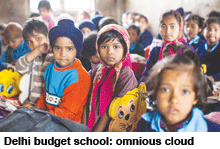The three-year deadline for enforcement of the Right to Free and Compulsory Education (RTE) Act, 2009 (notified on April 1, 2010) on two key parameters — establishment of neighbourhood schools and provision of basic school infrastructure including one-classroom-one-teacher, playground, toilets, barrier-free access, establishment of school management committees etc — ended on March 31. Now an ominous cloud of uncertainty hangs over an estimated 400,000 private unlicensed budget schools, sited in urban and village slums countrywide which claim an aggregate enrolment of 40-50 million children.
These children are from low-income but aspirational house-holds fed up with poor-quality vernacular-medium education dispensed in free-of-charge state government schools, defined by crumbling infrastructure, multi-grade teachers, chronic teacher truancy and poor learning outcomes. Rather than send their children to Dickensian government primaries, a growing number of parents have been enroling their wards in private budget schools which levy tuition fees of Rs.100-500 per month, but offer teachers who actually teach, and English education.
Now these 400,000 private budget schools which despite being hopelessly deficient in terms of infrastructure and teacher-pupil norms as specified in the Schedule of the RTE Act, are in danger of being forcibly shut down. S. 19 (3) of the RTE Act stipulates that the prescribed authority “shall’’ withdraw recognition and after such withdrawal, such schools have to shut down. Under s. 19 (5), promoters of derecognised schools which don’t cease operations are liable to pay a penalty of Rs.1 lakh and Rs.10,000 per day during contravention of the derecognition order.
 Most state governments which have missed the deadline have devised a mechanism to duck the issue of gran-ting or refusing recognition by getting these threatened schools to apply for recognition, and have kept their applications on hold, according to the members of the National Independent School Alliance (NISA), an informal platform of budget schools in India.
Most state governments which have missed the deadline have devised a mechanism to duck the issue of gran-ting or refusing recognition by getting these threatened schools to apply for recognition, and have kept their applications on hold, according to the members of the National Independent School Alliance (NISA), an informal platform of budget schools in India.
Meanwhile 28 civil society organi-sations including Centre for Civil Society (CCS), Absolute Return for Kids, Accountability Initiative, Akan-ksha Foundation, Akshara Foundation, Career Launcher, Central Square Found-ation (CSF), Centre for Assessment, Evaluation & Research (CAER), Pratham Books, Teach For India, and Thermax Social Initiative Foundation, among others involved in supple-mentary primary-secondary education provision, monitoring and research, have made common cause to save budget schools. They have appealed to the Central and state governments to review the RTE Act through the lens of learning outcomes, and ensure all children countrywide attain specified learning goals over the next five years.
“Enrolment data from across the country shows that government scho-ols are losing students as parents opt to send their children to low-fee private schools. However, many of these private schools face closure from April 1 if they fail to comply with infrastructure and teacher salary norms. This is compl-etely counter-productive because these input-based markers of school quality are not correlated with quality of learning outcomes. We therefore call for an approach to private school regul-ation based on transparency, and dis-closure of audited performance metrics as opposed to inputs,” the Group of 28 said in a joint statement released in Delhi on March 28.
According to Sridhar Rajagopalan, director of the Ahmedabad-based Education Initiatives (EI), an education research and assessment company, several studies including Pratham’s Annual Status of Education Report offer conclusive proof that learning levels in primary education are falling. Therefore the RTE Act’s focus on inputs rather than outcomes is inappropriate. “Stud-ents learning effectively must be the prime objective of education. We must not shy away from participating in international assessment programmes like Trends in International Mathematics and Science Study (TIMSS) or the Programme for International Student Assessment (PISA). If our students perform poorly in these tests we can take corrective measures. Dodging them is hardly in the national interest,’’ says Rajagopalan.
According to spokespersons of the Group of 28 civil society organisations, the next decade will witness the largest ever number of children in the school system in Indian history. According to them it is vitally important this generation which represents India’s demographic dividend is equipped with the literacy, numeracy, and skills needed to compete in a fast modernising world. “The only way to not fail this generation is if we make learning outcomes an explicit goal of education policy and invest in regular, high-quality and independent measurement of learning to monitor our progress vis-à-vis this goal,” the group said in its joint appeal statement.
An apposite and timely message. But in this inert and apathetic nation, who’s listening?
Autar Nehru (Delhi)